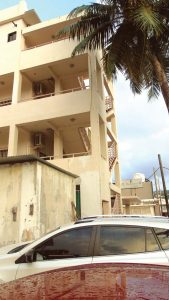IN REVEALING EXTENT OF BIRTH TOURISM NETWORK
FBI’s informant a physician
Witnesses identify clinic, buildings where defendant took, brought pregnant women

The Hua Mi Apartment in Garapan, which is also called Hanamitsu Hotel and Spa, where Sen Sun’s alleged clients and caretakers used to occupy the entire complex. (Ferdie de la Torre)
It was a physician who tipped off the Federal Bureau of Investigation to Sen Sun’s alleged operation of a large birth tourism network on Saipan, according to federal court documents.
FBI special agent Scott Berkland disclosed in an affidavit that a physician stated in an interview on Sept. 21, 2017, that Sun brought many of his clients to the Marianas Medical Clinic for prenatal checkups and normal childbirths.
Berkland issued the affidavit in support of the criminal complaint, seizure, and arrest warrants against Sun. The affidavit was filed in the U.S. District Court for the NMI last Nov. 2.
Sun, an alleged overstaying Chinese tourist, was indicted in federal court for allegedly operating an unlicensed business that offered trip packages to the CNMI for pregnant Chinese women seeking to give birth here.
Children born in the CNMI automatically obtain U.S. citizenship.
The indictment charged Sun with harboring illegal aliens, unlawfully employing aliens, and money laundering.
Berkland said the physician initially got to know Sun through their interaction at the Marianas Medical Clinic. Sun or an interpreter would accompany the women to their appointments.
The special agent said the physician then began living in Sun’s residence in July 2017, after which she gained more knowledge about Sun’s activities.
He said the physician stated that she knew Sun employed several interpreters from China who were working illegally on Saipan.
Sun also allegedly employed about 30 caretakers to cook, clean, and care for his clients while they were on island.
The physician believed Sun paid the caretakers approximately $1,000 per month, and that all of the caretakers were also working illegally.
The physician said that Sun drives a Lexus SUV.
Another confidential informant also provided information to the FBI about Sun’s activities.
Berkland believes the informant to be credible, and has corroborated much of the informant’s information through additional investigation such as interviews, physical surveillance, and video and audio recordings.
Berkland said that, on Oct. 4, 2017, the informant stated that Sun employed a caretaker from China who was working as a “hei gong,” a Chinese term denoting an illegal worker. The informant believed Sun paid the caretaker approximately $1,200 per month.
Berkland said the informant added that the caretaker lived in the Hua Mi apartment complex in Garapan.
The informant believed Sun’s clients and caretakers occupied the entire Hua Mi apartment complex.
Saipan Tribune learned from sources that Hua Mi apartment refers to the Hanamitsu Hotel and Spa.
In addition, Berkland said, the informant said the caretaker was a member of a WeChat group called “sai han a yi qun,” or “Saipan Aunty Group.” The group allegedly had 42 members, one of whom was the caretaker. The members worked as caretakers in the birth-tourism industry.
The informant believed that all of the caretakers were illegal and that many worked for Sun.
Berkland cited a WeChat communication where the caretaker allegedly stated that Sun paid her $1,800 per client, and that each client was for 45 days of work.
Berkland said the caretaker added that Sun paid her in cash, but that he only paid her when he was in a good mood and that he owed her several payments.
Berkland said the caretaker also stated that all of the caretakers in Hua Mi worked for Sun and added that Sun used several properties for client accommodations such as the Futaba, 747 Building, and the Sunshine Garden.
Berkland said that in an interview on Oct. 10, 2017, the caretaker stated that she had been working as a caretaker on Saipan illegally for about six months.
She also advised that she worked for Sun, who had paid her three times, each time in cash totaling $4,180.
The caretaker further stated that she had been recruited in China by a company that promised her she could enter the CNMI on a “landing visa” and then apply for a long-term resident/work visa once here.
Before arriving on Saipan, she was not aware that she was ineligible to work.
Berkland said the caretaker lived at the Hua Mi apartment complex and that she took care of one client at a time, and lived in the same unit as the client.
Berkland said the Hua Mi apartment has three floors and four units on each floor.
The agent said Sun used all of the units for his clients and caretakers.
Sun also allegedly used the Futaba and 747 Building for his clients and caretakers.
Berkland said the caretaker believed Sun employed about 30 caretakers, not one of whom had a work visa. All of the caretakers made approximately the same salary. She believed Sun paid all of the caretakers in cash or via account transfers in China.
Berkland said that, on Oct. 17, 2017, a cooperating source agreed to covertly record a dinner conversation with Sun.
The agent said the recording device malfunctioned, but the cooperating source nonetheless reported that during their conversations, Sun admitted knowing that his caretakers were illegally present and working in the CNMI, and that they were duped into coming to Saipan by a company in China promising permanent residency in the U.S.
Berkland said he was present during a verbal internet communication between a cooperating source and Sun last Nov. 1, in which Sun in Chinese stated that Saipan is really small and that he will find the cooperating source and he will make that the cooperating source give him back all of his money.
Berkland said he believes that Sun’s statements were intended as threats to physically harm the cooperating source.



























